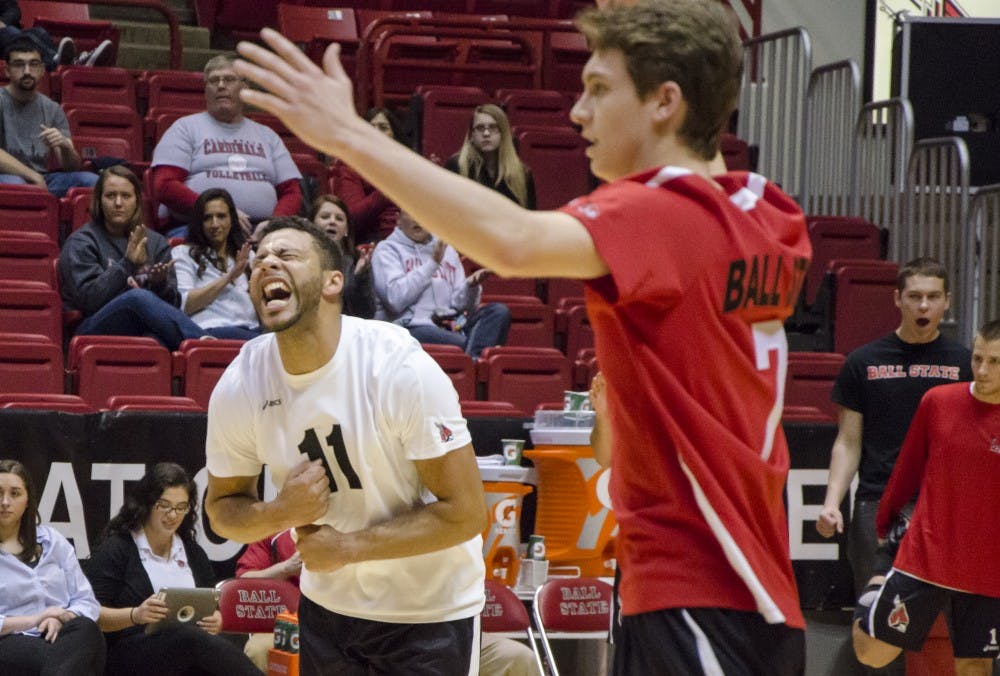Men’s volleyball players crouched on the court at Worthen Arena while coaches and other personnel dotted the sidelines or sat behind the media table.
The final point of a practice game came to a close, with Shane Witmer on the losing end. As Witmer walked away, he told his teammates they gave that match away.
There was nobody in the stands. With the exception of essential workers, nobody sees the competition that unfolds during every Ball State men’s volleyball practice. Emotions run high during the team scrimmages.
“It’s always that intense,” Ball State outside attacker Larry Wrather said. “We have to prepare as if we’re playing another team; so both sides are going all out to beat the other side, because we’re all a bunch of competitors and we don’t want to lose no matter what.”
The practice games are meant to improve players’ abilities and gain experience, while letting head coach Joel Walton see how players perform in high stress situations. Despite the games’ having no bearing on the team’s record, players approach them as if they do.
As the second game began, tensions began to rise. After libero David Ryan Vander Meer’s deflected an attack, he slowly rose to his feet and kicked the ball, which flew through the air, ricocheting off a bench chair and catching attention from players.
“Hey,” a coach called to Vander Meer, his voice sharp and assertive. He was getting tired of the team’s poor reactions during practice.
The team usually partakes in one to three matches per practice, in preparation for the weekend’s slate of games.
“These guys realize that if they perform well in practice, then they’ll get more chances on the weekend to play,” Walton said. “Learning to deal with the mentality of competition and stressful situations is important.”
Whether Worthen Arena is full of fans or full of cobwebs growing within the seats, players take the same mentality into every competition.
With the second game continuing, Walton announced that the losing side would have to do extra physical conditioning. Audible groans emerged from players.
“You put something like that on the line and it’s another motivator,” Walton said. “Nobody wants to do that physical conditioning, and they’re going to compete even harder.”
With the second game tied at 18, a player on Wrather’s side rejected an attack and sent it slamming back down on the opposite side.
“That’s right, baby. Way to block,” Wrather yelled loud enough for everybody to hear. “Way to get up there.”
With a compression sleeve supporting an injury to his left leg, Wrather didn’t stop giving full effort while attacking and blocking, doing everything he could to win.
In the next point, Wrather’s side would send an attack over, just barely trickling outside the box. The referee awarded the point to Hiago Garchet’s side, tying the match.
Tensions boiled over.
“That ball was in,” setter Graham McIlvaine said to the referee.
Outside attacker Marcin Niemczewski slammed the ball down. It skyrocketed into the air and tapped the middle of the Ball State volleyball advertisement on the unusedscoreboard, hanging high in Worthen Arena.
Walton had seen enough and awarded an extra point to Garchet’s side, sending a message that attitude wouldn’t be tolerated.
“Sometimes you need to address culture in practice,” Walton said. “If they see every time they behave in a certain way, it gives a point to the other team, we’ll start to change the culture.”
With Garchet’s team leading 24-20, Jack Lesure served an ace to end the match. He threw his arms up as his side celebrated around him. They gathered and leaned against the press table, watching the losing side perform their punishment.
The competitive nature of practice allows players to learn while not putting the team in danger of losing during a regulation match.
Even if they get heated.
“Bring one-hundred percent every time,” Urim Demirovski said.





